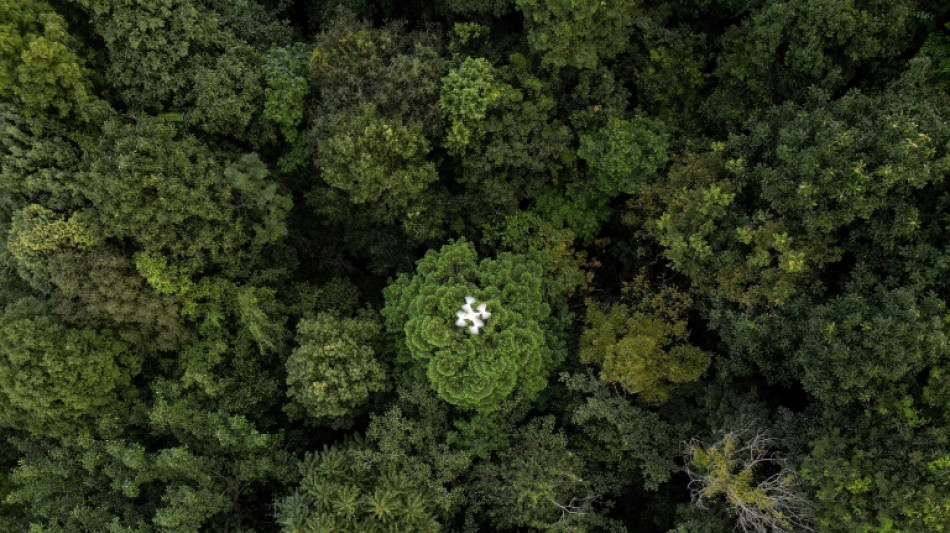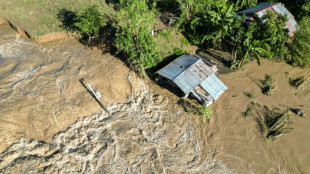
-
 Police break up Georgia vote protest as president mounts court challenge
Police break up Georgia vote protest as president mounts court challenge
-
Spain royals visit flood epicentre after chaotic trip

-
 France's Gisele Pelicot says 'macho' society must change attitude on rape
France's Gisele Pelicot says 'macho' society must change attitude on rape
-
G20 leaders talk climate, wars -- and brace for Trump's return

-
 US lawmaker accuses Azerbaijan in near 'assault' at COP29
US lawmaker accuses Azerbaijan in near 'assault' at COP29
-
Tuchel's England have 'tools' to win World Cup, says Carsley

-
 Federer hails 'historic' Nadal ahead of imminent retirement
Federer hails 'historic' Nadal ahead of imminent retirement
-
Ukraine vows no surrender, Kremlin issues nuke threat on 1,000th day of war

-
 Novo Nordisk's obesity drug Wegovy goes on sale in China
Novo Nordisk's obesity drug Wegovy goes on sale in China
-
Spain royals to visit flood epicentre after chaotic trip: media

-
 French farmers step up protests against EU-Mercosur deal
French farmers step up protests against EU-Mercosur deal
-
Rose says Europe Ryder Cup stars play 'for the badge' not money

-
 Negotiators seek to break COP29 impasse after G20 'marching orders'
Negotiators seek to break COP29 impasse after G20 'marching orders'
-
Burst dike leaves Filipino farmers under water

-
 Markets rally after US bounce as Nvidia comes into focus
Markets rally after US bounce as Nvidia comes into focus
-
Crisis-hit Thyssenkrupp books another hefty annual loss

-
 US envoy in Lebanon for talks on halting Israel-Hezbollah war
US envoy in Lebanon for talks on halting Israel-Hezbollah war
-
India to send 5,000 extra troops to quell Manipur unrest

-
 Sex, drugs and gritty reality on Prague's underworld tours
Sex, drugs and gritty reality on Prague's underworld tours
-
Farmers descend on London to overturn inheritance tax change

-
 Clippers upset Warriors, Lillard saves Bucks
Clippers upset Warriors, Lillard saves Bucks
-
Acquitted 'Hong Kong 47' defendant sees freedom as responsibility

-
 Floods strike thousands of houses in northern Philippines
Floods strike thousands of houses in northern Philippines
-
Illegal farm fires fuel Indian capital's smog misery

-
 SpaceX set for Starship's next flight, Trump expected to attend
SpaceX set for Starship's next flight, Trump expected to attend
-
Texans cruise as Cowboys crisis deepens

-
 Do the Donald! Trump dance takes US sport by storm
Do the Donald! Trump dance takes US sport by storm
-
Home hero Cameron Smith desperate for first win of 2024 at Australian PGA

-
 Team Trump assails Biden decision on missiles for Ukraine
Team Trump assails Biden decision on missiles for Ukraine
-
Hong Kong court jails 45 democracy campaigners on subversion charges

-
 Several children injured in car crash at central China school
Several children injured in car crash at central China school
-
Urban mosquito sparks malaria surge in East Africa

-
 Djibouti experiments with GM mosquito against malaria
Djibouti experiments with GM mosquito against malaria
-
Pulisic at the double as USA cruise past Jamaica

-
 Many children injured after car crashes at central China school: state media
Many children injured after car crashes at central China school: state media
-
Asian markets rally after US bounce as Nvidia comes into focus

-
 Tens of thousands march in New Zealand Maori rights protest
Tens of thousands march in New Zealand Maori rights protest
-
Five takeaways from the G20 summit in Rio

-
 China, Russia ministers discuss Korea tensions at G20: state media
China, Russia ministers discuss Korea tensions at G20: state media
-
Kohli form, opening woes dog India ahead of Australia Test series

-
 Parts of Great Barrier Reef suffer highest coral mortality on record
Parts of Great Barrier Reef suffer highest coral mortality on record
-
Defiant Lebanese harvest olives in the shadow of war

-
 Russian delegations visit Pyongyang as Ukraine war deepens ties
Russian delegations visit Pyongyang as Ukraine war deepens ties
-
S.Africa offers a lesson on how not to shut down a coal plant

-
 Italy beat Swiatek's Poland to reach BJK Cup final
Italy beat Swiatek's Poland to reach BJK Cup final
-
Japan, UK to hold regular economic security talks

-
 Divided G20 fails to agree on climate, Ukraine
Divided G20 fails to agree on climate, Ukraine
-
Can the Trump-Musk 'bromance' last?

-
 US to call for Google to sell Chrome browser: report
US to call for Google to sell Chrome browser: report
-
Macron hails 'good' US decision on Ukraine missiles


'Not the end of the world', says data scientist on the big issues
Humanity has made great strides in recent decades: air is cleaner; poverty, deforestation and childhood mortality have fallen; gasoline cars -- and maybe coal -- are on the way out.
This optimistic take on the state of affairs may be startling to some, but not Hannah Ritchie, a Scottish data scientist whose first book lets the facts speak for themselves.
"We just are unaware of how bad the past was," Ritchie told AFP from Edinburgh.
"People are just unaware that at least half of kids died, that diseases were rife, that most people lived in poverty, that most of the world were hungry."
Her book, "Not the End of the World", presents an evidence-rich counterpoint to the view that everything is going in the wrong direction, and offers possible approaches to the burning challenges of our time.
That also means climate change, a problem that Ritchie -- who is lead researcher at the Our World in Data website based out of Oxford University -- is careful not to understate.
"If you skew too far in one direction, I don't actually think you're telling the true story. We need to be clear-eyed about the problem in front of us," she said.
"That's actually not useful -- to deny it, or downplay it, or not be serious about it. But at the same time, you also need to focus on solutions, so we actually drive progress forward."
Those solutions are not always obvious, Ritchie said, and focus can be misguided when it comes to choosing what personal action to take in aid of the planet.
Ritchie pointed to the tendency in rich countries to hype behaviours that have little real impact -- such as recycling or ensuring televisions are not left on stand-by mode -- while continuing to drive, fly and eat meat.
Assuming everything 'natural' is automatically good can also mask some inconvenient realities, she added.
Huddling around a campfire can produce a sense of closeness to nature, but burning wood belches out smoke harmful to humans and the planet.
"What looks sustainable is the natural cow in a green field eating grass. But actually, when you do the numbers on this, the meat substitute burger is vastly, vastly better on almost any environmental metric compared to the cows," she said.
An advocate of lab-grown meat, nuclear power and GMO, Ritchie does not relish being contrarian on tackling environmental problems.
"I don't take delight in being provocative. I just care about the truth," she said.
- Plastic and palm oil -
Ritchie's data-driven conclusions can run counter to the conventional wisdom about how to save the planet.
But they can be illuminating, identifying areas where resources might be better spent elsewhere.
For example, reducing the amount of plastic bags or bottles consumed in Europe might seem a good idea on paper.
But hardly any of the plastic in the sea originates from Europe, with most flowing from Asia, which does not have the same rigorous waste management schemes in place.
"If everyone in Europe stopped using plastics tomorrow the world's oceans would hardly notice the difference," Ritchie wrote in her book.
Palm oil -- the sworn enemy of environmental defenders -- is "an insanely productive plant" that generates far more oil per hectare of land than alternatives like soybean and coconut, she added.
"If we were to boycott palm oil and replace it with one of these alternatives, we would need far more farmland."
Synthetic fertilisers -- another target of environmental movements -- were essential to grow the food that sustains half the world's population.
"The reality is that the world cannot go organic. Too many of us rely on fertilisers to survive," Ritchie wrote, adding that many countries could still reduce the amount of fertiliser they use.
- 'Zombie statistics' -
Ritchie said "zombie statistics" -- bogus facts or figures that get regurgitated over and over -- have a lot to answer for.
Claims that the world's soils would be depleted after 60 more harvests had been repeated time and time again over the past decade despite lacking any reliable source, she said.
Her book returns often to food, not surprising when considering that what we eat, and how it is grown and transported, has a major impact on warming the planet.
Energy, which accounts for more than three-quarters of total greenhouse gas emissions, is in transition: electric cars, heat pumps, and solar energy are changing the game.
But the food system, which represents about a quarter, is far from igniting its own revolution and poses its own unique obstacles.
"For people, food is very identity-driven. It's very personal... And I think it's just much harder and much slower to change that," Ritchie said.
"I'm not that convinced that people move away from meat consumption to traditional plant based products. If you're looking for the large scale, rapid change that you need, people are not going to move to lentils and tofu."
F.Wilson--AT

